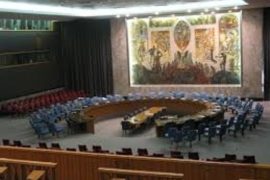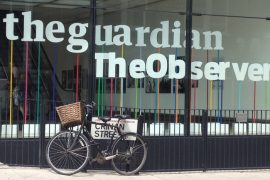There was no Guardian editorial condemning the April 7 execution of three Israeli Jewish civilians in Tel Aviv by a Palestinian from Jenin named Raad Hazem – or in response to any of the terror attacks in Israel and the West Bank since March 22 that have left 19 dead. The murder of innocent Jews by Palestinian or Arab extremists, often inspired by ubiquitous antisemitic incitement by their leadership, is not and has never been a moral concern to the Guardian or their readers.
However, the killing of Al Jazeera journalist Shireen Abu Aqleh during a firefight between Israeli soldiers and Palestinian gunmen in Jenin, under unclear circumstances, prompted an official editorial (“The Guardian view on Shireen Abu Aqleh: press freedom under attack”, May 13) that not only presumes Israeli guilt, but dishonestly suggests that their army intentionally targets journalists.
The editorial begins by framing Abu Aqleh’s death as representing an attack on press freedoms in “the Holy Land” – a charge which, in theory, could include attacks and restrictions on journalists by the Palestinian leadership, but, based on the subsequent text, clearly is aimed only at Israel:
Abu Aqleh was among a group of journalists covering a raid by the [IDF] in…Jenin on Wednesday when, according to reporters present, soldiers shot her in the head…Her Qatar-based employer accused Israeli soldiers of shooting Abu Aqleh “in cold blood”.
The term “in cold blood” – employed by an outlet well-known as a mouthpiece for the Qatari royal family that routinely promotes radical Islamist and antisemitic messaging – refers to killings that are intentional. The Guardian editorial continues with contempt towards any Israeli response questioning soldiers culpability, writing that “Israel’s response was a familiar one: claim the shooter was a Palestinian”, and then writing “Israel now says its troops may have “accidentally” shot her”.
Yes, in the firefight with terrorists in question, it’s certainly possible, given the evidence currently available, that Israeli forces accidentally – as opposed to a deliberate killing – shot the journalist. But, it’s staggering that editors can be totally dismissive of the other possibility: that Palestinian terrorists fired the shot killing Abu Aqleh. Let’s remember that a Palestinian forensic doctor from the PA Health Ministry acknowledged that he couldn’t determine who was to blame – a fact not reported by the Guardian to date in their coverage of the incident.
The editorial continues:
Whoever shot Abu Aqleh ought to be held accountable. But the Israeli army investigating itself will not have the trust of Palestinians, or the wider world.
This is supremely dishonest, as they omit the fact that Palestinian leaders have refused Israeli offers to conduct a joint investigation. So, the army and foreign ministry would clearly prefer not to ‘investigate itself’, as the editorial suggests. It is not Israel, but the Palestinian leadership – who, typically, the Guardian doesn’t factor into the equation at all – who are stymying a fair and impartial examination of the incident.
The most appalling passages of the editorial follows:
At least 47 journalists have been killed by Israeli forces since 2000. Palestinians are particularly vulnerable, too often treated not as impartial observers but as partisans – rarely receiving official accreditation, having their movements restricted and being assaulted with impunity. No one has been held to account in Israel for media deaths.
The press release they link to is based on a report by International Federation of Journalists that is deeply flawed, as it includes, in its tally of “journalists” killed by Israeli forces, those, like Yasser Abd al-Rahman Murtaja, who were actually Hamas operatives. Alternatively, the Committee to Protect Journalists has a thorough list which reports that 19 journalists have been killed in Israel and the Palestinian territories – a region where a disproportionate number of journalists are stationed – in a database going back to 1992. Most were killed by “crossfire”, with one intentionally murdered – by Palestinians.
In other words, contrary to the Guardian’s suggestion, it’s extremely rare for a journalist to be killed in the region, and those who are killed are typically victims of “crossfire” in conflict zones.
If the Guardian was truly concerned about press freedom, they would have consulted Reporters Without Borders, which lists ‘Palestine’ among the worst places for press freedom, ranking them 170th out of 180 countries/territories listed. The internationally respected human rights group Freedom House confirms that Israel is generally a hospitable place for journalists to do their work, ranking Israel’s ranking three out of a high score of four, whilst the Palestinian territories are ranked just one out of four.
It’s telling that even al-Jazeera has reported on the PA’s increasing “crackdown on journalists”, citing the Palestinian Center for Development and Media Freedoms reporting they are increasingly “facing increased harassment, arrests and violence”. In June 2021 alone, following the killing of Palestinian dissident Nizar Banat, the group recorded “69 violations against Palestinian journalists by different Palestinian parties in the West Bank and Gaza, including 17 incidents of physical assault and two arrests, 11 confiscation and destruction of journalists’ equipment”.
But, of course, the failure of Palestinian leaders to create and nurture liberal traditions, norms and laws, a culture of transparency and respect for Palestinian human rights within the territories they govern is not the story Guardian editors will tell. The media institution’s rigid ideological orientation denying Palestinians agency demands the erasure of all evidence complicating the desired narrative, resulting in reporting based on the assumption of Palestinian innocence and Israeli guilt.
If you think we’re exaggerating, let’s remember that the Guardian is an outlet which literally once argued that it would have been better for the world if Israel had never been born. The Jewish state, in their view, is a state beyond the pale, one which can’t be reformed – a people not only undeserving of statehood, but representing an “organic obstacle to peace and progress”.
Related Posts
Guardian peddles propaganda about Al Jazeera journalist’s death





